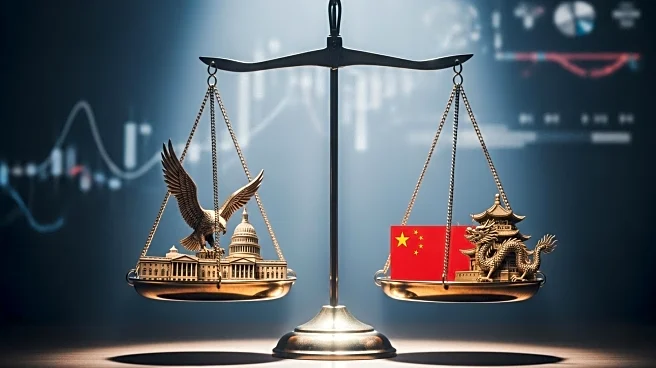What's Happening?
An annual survey conducted by the American Chamber of Commerce in Shanghai indicates that many U.S. companies operating in China are experiencing reduced sales due to tariffs imposed by President Trump. The survey, which included responses from 254 companies, found that nearly two-thirds expect a decline in revenue for their China operations in 2025. President Trump has implemented a 30% tax on imports from China, following a previous increase to 145% before a mutual agreement to reduce tariffs was reached in May. In retaliation, China has imposed a 10% tax on U.S. imports. These tariffs are affecting companies that export to the U.S. and those importing American parts for production in China, particularly impacting manufacturers.
Why It's Important?
The tariffs imposed by President Trump and the retaliatory measures by China are significant as they affect the financial performance of U.S. companies operating in China. The survey highlights that manufacturers are particularly vulnerable, with nearly three-quarters anticipating reduced revenues. This situation underscores the broader economic tensions between the U.S. and China, which are seen as a major challenge for businesses over the next few years. The ongoing trade disputes and tariffs could lead to increased costs for consumers and businesses, potentially affecting global supply chains and economic stability.
What's Next?
The future of U.S.-China trade relations remains uncertain as both countries continue to engage in trade talks. The American Chamber of Commerce in Shanghai emphasizes the need for improved bilateral relations, which is considered a top priority by its members. The ongoing appeal of the tariffs' legality to the Supreme Court adds another layer of complexity to the situation. Companies are facing challenges in planning for the future due to the unpredictability of trade policies and tariffs.
Beyond the Headlines
The legal challenges to President Trump's tariffs highlight the tension between executive powers and judicial oversight in the U.S. The tariffs have been ruled as an illegal use of emergency powers by American courts, yet they remain in effect pending appeal. This situation raises questions about the balance of power and the role of the judiciary in checking executive actions. Additionally, the tariffs and trade tensions may influence long-term shifts in global trade practices and economic alliances.










